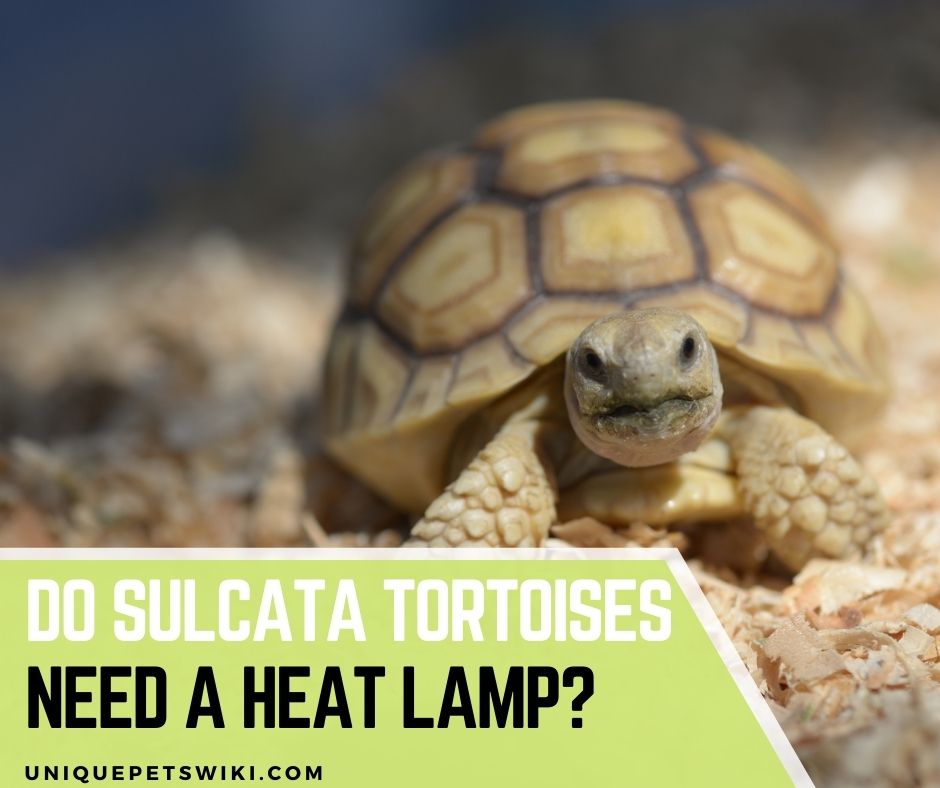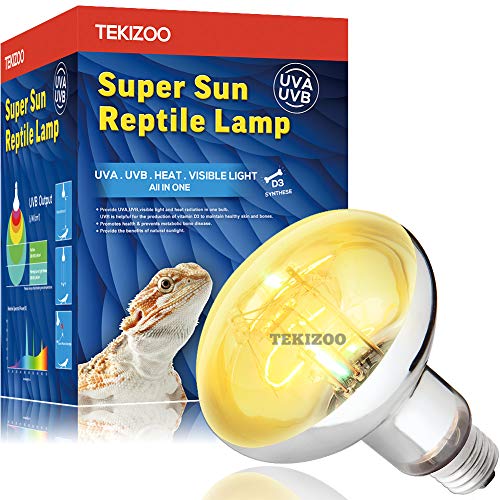Generally, reptiles are not like conventional pets such as cats and dogs. They require certain conditions in their cage to help keep them healthy and happy. One of the most important things needed by tortoises in their cage is the right temperature at all times and you’ll need a heat lamp or any other heat source to provide that.
The reason for maintaining an ideal cage temperature in your reptiles’ cage is because they are cold-blooded and cannot generate their own body heat. On that note, this article “Do Sulcata Tortoises Need A Heat Lamp?” promises to give you three best heaters for sulcata tortoises and other desert-dwelling tortoise species.
Sulcata tortoises are among the largest tortoises and the easiest to care for tortoise species you can keep as a pet. Like any other tortoise species, they need to spend time basking under the sun to help them function properly.
As a responsible sulcata tortoise owner, you may be wondering whether you should provide a heat lamp for your tortoise. In this article, we will break down everything you need to know about sulcata tortoise heat requirements, from whether they need a heat lamp to the best lamp suitable for them.
Contents
Do Sulcata Tortoises Need A Heat Lamp?
Yes, sulcata tortoises will need a heat lamp if they do not have access to the sun. They will need the heat to help them regulate their body temperature as they are cold-blooded animals.
Furthermore, younger sulcata tortoises will need proper heating to help them grow up healthy as they are underdeveloped.

Heat In During The Day
Sulcata tortoises living outdoors are usually tolerant to a wide range of temperature levels. They don’t have problems with high temperatures if there are shaded areas that they can escape to whenever they want.
They can also handle cold temperatures as low as 45oF without any problem. However, when keeping sulcata tortoise indoors, you will need to maintain a normal room temperature around 68-80oF during the day.
You will also need to provide a basking spot that is about 100F for them. Furthermore, they will need a UVB light that will be on for 12-14 hours per day in their enclosure.
Heat At Night
At night, sulcata tortoise needs a drop in temperature and darkness. Temperature can drop to about 80F at night.
When keeping sulcata tortoise outdoors, you will need to provide a heated hide box about 55-60F if the nighttime temperature drops below 50F. You may bring your tortoise indoors when this happens.
However, when keeping your sulcata tortoise indoors, you will need to ensure that their nighttime enclosure is not below 70F.
Best Heat Bulb For Sulcata Tortoise
Just like a proper UVB and diet, it is important to choose a proper heater for your sulcata tortoise’s enclosure. Using a correct heater for your tortoise helps aid digestion, promotes healthy tissues, and increases blood circulation.
Some of the best heat sources that you can use to get the correct heating for your sulcata tortoise are stated below.

Ceramic Heat Emitter Bulbs
Last update on 2022-12-30 / Affiliate links / Images from Amazon Product Advertising API
Ceramic heat emitters are non-light emitting bulbs that you can use to produce heat any time of the day. Since it does not produce light, you will need to have a good UVB source for lighting when using ceramic heat emitters in indoor enclosures.
Furthermore, you can use ceramic heat emitters as a nighttime heat source when you are housing your sulcata tortoise outdoors and the temperature drops.
Besides increasing ambient air temperature, ceramic heat emitter bulbs can provide a good basking temperature for your tortoise. Common wattage for ceramic heat emitters is 60w, 75w, 100w, and 150w bulbs.
Furthermore, you need to ensure the bulb is far from your tortoise’s shell as it can easily burn it. You will also need a thermostat to ensure you get the proper temperature for your sulcata tortoise enclosure.
Flood Bulbs
Last update on 2022-12-30 / Affiliate links / Images from Amazon Product Advertising API
Flood bulbs can be used for producing light and heat for your sulcata tortoise. Furthermore, you can use the regular household incandescent flood bulbs to produce the required heat for an indoor sulcata tortoise enclosure.
However, you will need to test the heat output of a flood bulb using a thermometer. When using a flood bulb, you will also need to provide a UV source for your tortoise’s enclosure.
Mercury Vapor Bulbs
Last update on 2022-12-30 / Affiliate links / Images from Amazon Product Advertising API
Mercury vapor bulbs can be used to provide UVA, UVB, heat, and light for your tortoise’s enclosure. They are quite popular than other heat sources, and some of the common mercury vapor bulbs out there are ExoTerra Solar Glo, ZooMed PowerSun, Mega-Ray, etc.
You will need to check the UV emissions regularly when using a mercury vapor bulb. This is because the UV output of this bulb can be reduced quickly. You can monitor the UV output using a solar meter.
Furthermore, it is recommended that you replace this bulb every six months. Many people even believe that the UV of the bulb falls below recommended range within three months, while some can last longer.
Note: mercury vapor bulbs can still produce heat and lighting for a long time while the UV rays have a short span.

Wrapping Up
Sulcata tortoise is a cold-blooded animal and requires heat to help function well. This shows that they will need a heated enclosure to keep them happy and healthy. Furthermore, you will need to provide them with a heat lamp regardless of their age.



